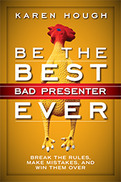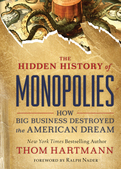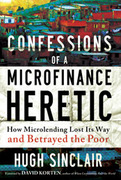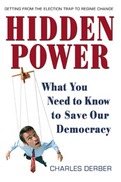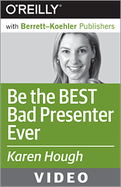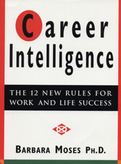Hough debunks over a dozen myths about presenting to make it more fun and natural for everyone. She explains how practicing in front of a mirror makes you worse, why you should never end with questions, and much more. She includes true stories of people who not only were able to become great presenters by being “bad” but actually came to enjoy it! Like them, by following Karen Hough's wise and witty advice, you'll be able to tear up the old rules and embrace and develop your own style. You'll be freed to be a living, breathing, occasionally clumsy human being whose enthusiasm is powerful and infectious.
American monopolies dominate, control, and consume most of the energy of our entire economic system; they function the same as cancer does in a body, and, like cancer, they weaken our systems while threatening to crash the entire body economic. American monopolies have also seized massive political power and use it to maintain their obscene profits and CEO salaries while crushing small competitors.
But Thom Hartmann, America's #1 progressive radio host, shows we've broken the control of behemoths like these before, and we can do it again.
Hartmann takes us from the birth of America as a revolt against monopoly (remember the Boston Tea Party?), to the largely successful efforts of both Presidents Theodore and Franklin Roosevelt and other like-minded leaders to restrain corporations' monopolistic urges, to the massive changes in the rules of business starting during the “Reagan Revolution” that have brought us to the cancer stage of capitalism.
He shows the damage monopolies have done to so many industries: agriculture, healthcare, the media, and more. Individuals have taken a hit as well: the average American family pays a $5,000 a year “monopoly tax” in the form of higher prices for everything from pharmaceuticals to airfare to household goods and food. But Hartmann also describes commonsense, historically rooted measures we can take—such as revitalizing antitrust regulation, taxing great wealth, and getting money out of politics—to pry control of our country from the tentacles of the monopolists.
A deeply personal story written by a microfinance insider whose decade in the industry turned him into a heretic. It reveals the shocking truth of the industry once hailed as the miraculous solution to world poverty, and profiles the few shining exceptions to industry-wide corruption.
- A deeply personal story written by a microfinance insider who was once tapped as an anonymous source for a New York Times exposé
- Reveals the shocking truth of the industry once hailed as the miraculous solution to world poverty
- Profiles the few shining exceptions to industry-wide corruption and offers solutions to clean up the rest
- Please click here for press release
Offering inspiring success stories, the microfinance industry depends on the faith of investors that small loans can transform the lives of the poor. But as Hugh Sinclair points out, very little solid evidence exists that microloans make a dent in long-term poverty. Evidence does exist for negligence, corruption, and methods that border on extortion. Part exposé, part memoir, and part financial detective story, this is the account of a one-time true believer whose decade in the industry turned him into a heretic.
Sinclair worked with several microfinance institutions and funds as he traveled from Mexico to Mongolia, with Nigeria, Holland, and Mozambique in between. He couldn't help but notice that even with a booming $70 billion industry on their side, the poor didn't seem any better off in practice. Exorbitant interest rates led borrowers into never-ending debt spirals, and aggressive collection practices resulted in cases of forced prostitution, child labor, suicide, and nationwide revolts against the microfinance community.
With characteristic intelligence and biting wit, Sinclair weaves a shocking tale of a system increasingly focused on maximizing profits. The situation worsened when large banks, attracted by the high repayment rates of overpriced loans, hijacked the sector and created a microfinance bubble. Sinclair details his discovery of several scandals, one of the most disturbing involving a large African Microfinance institution of questionable legality which charged interest rates in excess of 100% per year, and whose investors and supporters included some of the most celebrated leaders of the microfinance sector. Sinclair's objections were first met with silence, then threats and attempted bribery, a court case, and eventually led him to become a principle whistleblower in a sector that had lost its soul.
Microfinance can work-Sinclair describes moving experiences with several ethical and effective organizations and analyzes what made them different. But without the fundamental reforms that Sinclair recommends here, microfinance will remain an "investment opportunity" that will leave the poor with hollow promises and empty pockets.
- A deeply personal story written by a microfinance insider who was once tapped as an anonymous source for a New York Times expos
- Reveals the shocking truth of the industry once hailed as the miraculous solution to world poverty
- Profiles the few shining exceptions to industry-wide corruption and offers solutions to clean up the rest
- Please click here for press release
Offering inspiring success stories, the microfinance industry depends on the faith of investors that small loans can transform the lives of the poor. But as Hugh Sinclair points out, very little solid evidence exists that microloans make a dent in long-term poverty. Evidence does exist for negligence, corruption, and methods that border on extortion. Part expos, part memoir, and part financial detective story, this is the account of a one-time true believer whose decade in the industry turned him into a heretic.
Sinclair worked with several microfinance institutions and funds as he traveled from Mexico to Mongolia, with Nigeria, Holland, and Mozambique in between. He couldnt help but notice that even with a booming $70 billion industry on their side, the poor didnt seem any better off in practice. Exorbitant interest rates led borrowers into never-ending debt spirals, and aggressive collection practices resulted in cases of forced prostitution, child labor, suicide, and nationwide revolts against the microfinance community.
With characteristic intelligence and biting wit, Sinclair weaves a shocking tale of a system increasingly focused on maximizing profits. The situation worsened when large banks, attracted by the high repayment rates of overpriced loans, hijacked the sector and created a microfinance bubble. Sinclair details his discovery of several scandals, one of the most disturbing involving a large African Microfinance institution of questionable legality which charged interest rates in excess of 100% per year, and whose investors and supporters included some of the most celebrated leaders of the microfinance sector. Sinclairs objections were first met with silence, then threats and attempted bribery, a court case, and eventually led him to become a principle whistleblower in a sector that had lost its soul.
Microfinance can workSinclair describes moving experiences with several ethical and effective organizations and analyzes what made them different. But without the fundamental reforms that Sinclair recommends here, microfinance will remain an investment opportunity that will leave the poor with hollow promises and empty pockets.
2005
- Presents an original analysis of what the real sources of power are in America today
- Reveals the tactics used by corporate interests to wield hidden power
- Offers detailed strategic advice for how the Democrats can unite with grassroots social movements and form a powerful coalition for fundamental change
- Thom Hartmann, Air America radio host and bestselling author of Screwed, says "Hidden Power is the must-read book of the year. Buy three copies, at least, because you'll want to share a few with friends, and will never want to part with your own well-marked-up copy." read the full review
1998
Moses paints a vivid picture of the current dislocations in the workplace-the extraordinary productivity pressures, the erosion of personal time-and their gut-wrenching effects on individuals and their families. She reveals how changes in the workplace have affected different generations differently-from 20-somethings trying to get a foothold in the workplace to 30-somethings concerned about getting ahead to aging boomers recently displaced from the workforce-and examines their values, their psychological profile, and their future opportunities. She also presents a striking vision of the future, showing what it will be like to live and work in tomorrow's world, where we will all be free agents.
In clear, practical terms, Career Intelligence shows how individuals can benefit from key future trends and details the skills they will need to succeed-from learning how to self-market to being able to communicate in powerful ways, from understanding business trends to preparing for areas of competence. Chock full of concrete examples and anecdotes that everyone can relate to, Career Intelligence also offers advice to parents concerned about "career proofing" their children; gives managers insights into how to promote career independence and self-reliance in their staff; and discusses solid ways organizations can improve morale and productivity. Comprehensive, practical, and eminently readable, Career Intelligence provides a visionary blueprint for ongoing career success.
- By the bestselling author of Career Planning Workbook-used by almost one million people in over 1,500 organizations worldwide
- Shows people how to take control of your career, even in the face of tumultuous changes in today's workplace
- Presents 12 new rules for career success based on leading-edge insights into today's radically changed workplace


